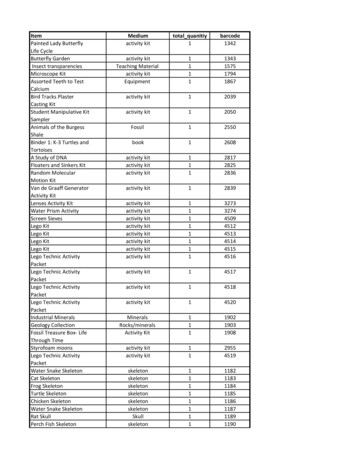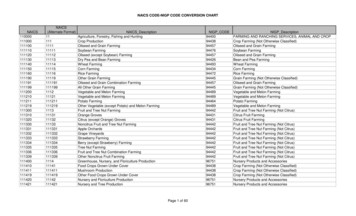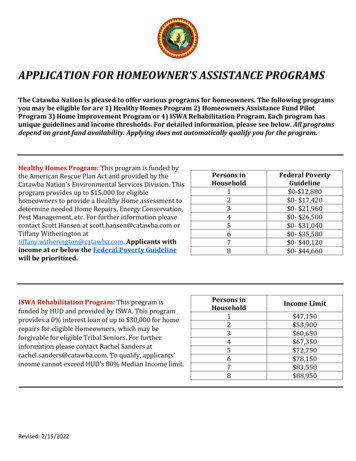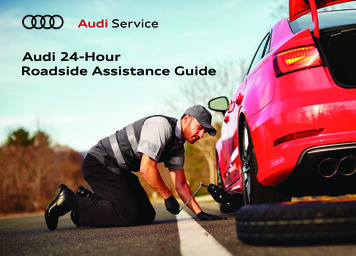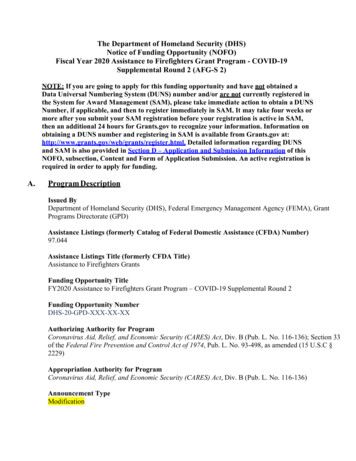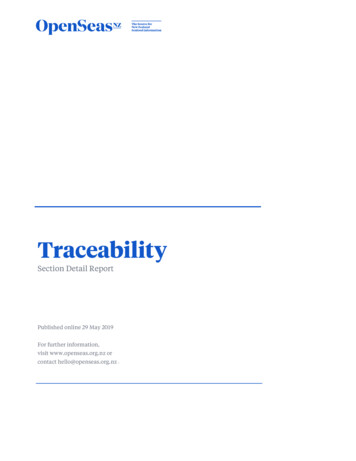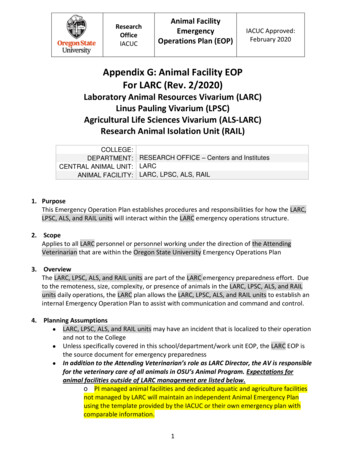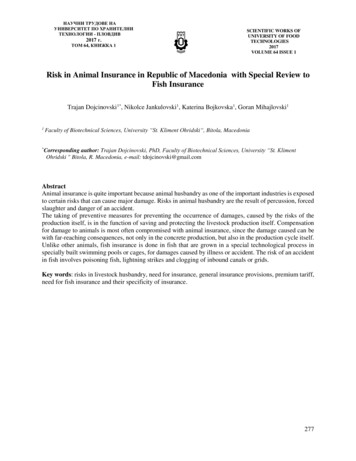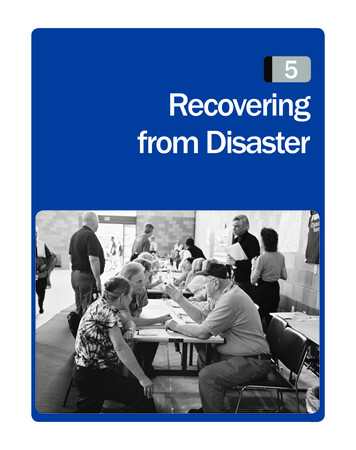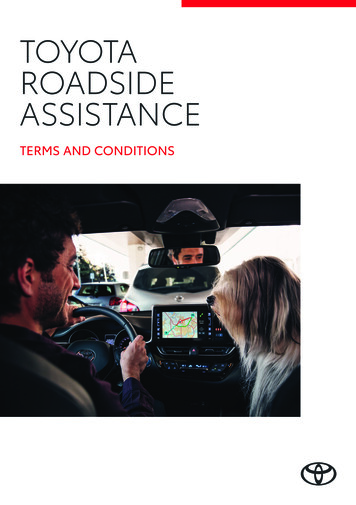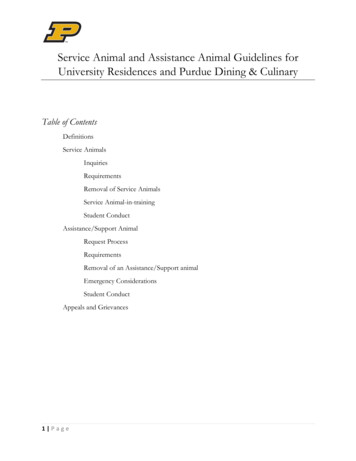
Transcription
Service Animal and Assistance Animal Guidelines forUniversity Residences and Purdue Dining & CulinaryTable of ContentsDefinitionsService AnimalsInquiriesRequirementsRemoval of Service AnimalsService Animal-in-trainingStudent ConductAssistance/Support AnimalRequest ProcessRequirementsRemoval of an Assistance/Support animalEmergency ConsiderationsStudent ConductAppeals and Grievances1 Page
DefinitionsHandler:An individual with a disability who receives assistance from a service animal or a personal careattendant who handles the service animal for an individual with a disability.Service Animal:Any dog* individually trained to do work or perform tasks for the benefit of an individual with adisability, including a physical, sensory, psychiatric, intellectual, or other mental disability and meetsthe definition of “Service Animal” under the Americans with Disabilities Act (“ADA”) regulations.The work or task performed must be directly related to the individual’s disability.The provision of emotional support, wellbeing, comfort, or companionship do not constiute workor tasks for the purpose of this definition.*Under particular circumstances a miniature horse may also qualify as a Service Animal under 28CFR 35.136(i).Owner:An individual with a disability who has requested the accommodation and has received approval forbringing their assistance animal into University Residences housing.Assistance Animal:An assistance animal is an animal that works, provides assistance or emotional support that alleviatesone or more symptoms of a person’s disability, as set forth in the Fair Housing Act (“FHA”).Assistance animals do not perform work or tasks that would qualify them as a “Service Animals”under the ADA.Access to Campus Areas:Individuals may view the operating procedures for service animal on campus policy at the s of Animal Owners/Handlers:Animals are the sole responsibility of the owner/handler. The owner/handler is responsible for theoverall health and well-being of the animal, including all cost associated with the animal’s care, livingarrangements, and any property damage caused by the animal.Animals on campus must: Be current on all vaccinations;Be housebroken;Be licensed per local laws and ordinaces;2 Page
Be in good health;Be under the full control of the owner/handler at all times.Owner/Handlers must follow local ordinances in cleaning up the service animal’s waste. Individualswith disabilities who physically cannot clean up after their own service animals are not required topick up and dispose of feces. Handlers should contact University Residences staff if this issue arises.Service AnimalsINQUIRIESA handler living in University Residences should schedule an appointment with the CampusLiving and Compliance team to discuss access to the residence halls, dining, animal control,waste clean up, and other responsibilities. To obtain an appointment please call (765) 4941000.University Residences and Purdue Dining & Culinary may make inquiries to determinewhether an animal qualifies as a Service Animal. Staff will ask:1. Is the animal required because of a disability?2. What work or task has the animal been trained to perform?When it is apparent that an animal is trained to do work or perform tasks for an individualwith a disability, no inquiry will be made.REQUIREMENTS1. The service animal should respond to voice or hand commands at all times, andbe under the full control of the handler. The service animal should be on a leashor harness at all times, unless the use of a leash or harness would interfere withthe safe, effective performance of required work or tasks. In this instance, theservice animal must be otherwise under the effective control of the handler byvoice control, hand signals, or other effective means.2. Service animals should only be under the control or possession of their handler.3. Etiquette of the service animal should be unobtrusive to other individuals andthe living environment. The handler should ensure that the service animals doesnot: Actively seek the attention of other people. Sniff people, dining tables or food service bars, or the personal belongings ofothers. Display any behaviors or noises that are disruptive to others, unless it is partof the service, work or task that is being provided to the handler. Block an aisle or passageway for emergency/fire egress.3 Page
REMOVALService animals may be removed from University facilities or grounds in certain situationsincluding if the animal:1.2.3.4.Is unreasonably disruptive and not brought under the control of the handler;Poses a threat to the health or safety of an individual;Would cause a fundamental alteration to a university program, service or activity;Is not housebroken.STUDENT CONDUCTResidents in a Purdue Dining & Culinary or University Residences facility who do not meetthe above expectations may go through the conduct process to resolve instances of noncompliance.Assistance animalREQUEST PROCESSResidents must submit appropriate documentation to the Disability Resource Center for anassistance animal. Send requests to the following website:https://www.purdue.edu/drc/Once approval is granted, residents are notified when they can bring their assistance animalinto University Residences.REQUIREMENTS1. Keep the animal in the assigned residence hall unit. An assistance animal must becontained within the owner’s privately assigned room, except to the extent thatthe owner is taking the animal outside for natural relief. An assistance animal isnot permitted in other students’ rooms or the common areas of the residentialfacilities, and other areas of the University such as classrooms, academicbuildings, administrative buildings, libraries, dining services areas, fitness center,pool etc.2. Maintain control over the assistance animal. The animal must be under thecontrol of the owner at all times, and the owner is responsible for making surethe assistance animal does not disrupt the residential community. The owner isresponsible for ensuring that the animal is contained, as appropriate, when theowner is not present during the day while attending classes or other activities.4 Page
3.4.5.6.7.5 PageWhen an assistance animal is left unattended in a student’s room, they arerequired to be stored in a crate, carrier or kennel. This containment will allowUniversity Residences officials to routinely access the residential facilities formaintenance and other routine tasks without posing risk to the animal oremployees. The owner will hold the University blameless in the event theassistance animal goes missing. University staff is not responsible for the retrievalof the assistance animal in the event the animal escapes or becomes lost. If anassistance animal is found running at large, the animal is subject to capture,confinement and immediate removal from University Residences.Ensure the assistance animal is well cared-for. The owner is solely responsiblefor the animal’s well-being, care and cleaning, including but not limited to regularfeeding, bathing, grooming, daily care and veterinary services. Any evidence ofmistreatment, abuse, neglect, or leaving the assistance animal unattended forunreasonably long periods may result in immediate removal of the assistanceanimal and/or discipline for the owner. University personnel shall not berequired to provide care or food for any assistance animal including, but notlimited to, removing the animal during emergency evacuation for events such asa fire alarm. Emergency personnel will determine whether to remove the animaland may not be held responsible for the care, damage to, or loss of the animal.Unless expressly approved by University Residences, the assistance animal maynot be left unattended overnight in the residential facilities to be cared for byanother student. The assistance animal must be taken with the owner if theyleave campus overnight or for a prolonged period.Manage animal relief and waste in a sanitary manner. The owner is responsiblefor immediately removing and properly disposing of animal relief and wastedeposited on University grounds or within the facilities. Assistance animal mustbe taken out of the building by way of the shortest and most direct path, andmust be maintained under standard restraints such as a carrier and/or collarwhen outdoors, in public areas, or in transit and must be confined to theresidence when not in transit.Be responsible for flea, tick, or pest damage or infestation caused by theassistance animal. The owner’s residence may be inspected for fleas, ticks, pests,and/or damage to the residential facilities once a semester or as needed.University Residences will schedule the inspection and notify the resident inadvance of the scheduled inspection. If fleas, ticks, or other pests are detectedthrough inspection, the residence hall will be treated using approved fumigationmethods by a University-approved pest control service. The owner will be billedfor the expense of any necessary pest control treatment.Be responsible for property damage caused by the assistance animal. The ownerwill be financially responsible for expenses incurred above a standard cleaning orfor repairs, beyond reasonable wear and tear, to the residential premises,including losses, liability, claims, and harm to others caused by the assistanceanimal.
8. Notify the DRC if the assistance animal is no longer needed or is no longer inUniversity Residences. The owner must notify the DRC in writing if theassistance animal is no longer needed as or is no longer in the residentialfacilities. To replace a previously approved assistance animal, the new animalmust be necessary because of the owner’s disability, and the owner must followthe Housing Accommodation Request process when requesting a new animal.9. Provide updated health documentation at the start of each academic year.assistance/support animal owners remaining in University Residences formultiple years must submit updated ASSISTANCE ANIMAL HealthDocumentation prior to the start of each academic year by August 1.REMOVALAssistance animals may be removed from University facilities or grounds in certain situationsincluding if the animal:1.2.3.4.Is unreasonably disruptive and not brought under the control of the handler;Poses a threat to the health or safety of an individual;Would cause a fundamental alteration to a university program, service or activity;Is not housebroken.STUDENT CONDUCTResidents in a Purdue Dining & Culinary or University Residences facility who do not meetthe above expectations may go through the conduct process to resolve instances of noncompliance.Appeals and GrievancesIn the event the requesting individual disagrees with an accommodation determination, theindividual is encouraged to contact the office that made the determination to attempt to resolve theissue informally. The student who disagrees may file an accommodation concern at the followinglink:Accommodation Concern Form- Students- West Lafayette Campus6 Page
Residents in a Purdue Dining & Culinary or University Residences facility who do not meet the above expectations may go through the conduct process to resolve instances of non-compliance. Assistance animal REQUEST PROCESS Residents must submit appropriate documentation to the Disability Resource Center for an assistance animal.
